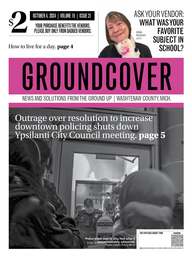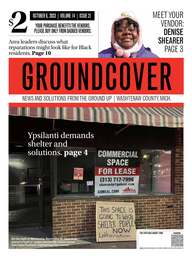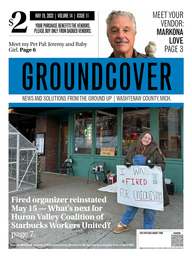6
GROUNDCOVER NEWS
COMMUNITY LAND TRUST
OCTOBER 3, 2025
Ann Arbor Community Land Trust breaks ground on
permanently affordable housing for critical workers
and families
A community land trust is a nonprofit
corporation that owns land and
leases it to individuals, nonprofit corporations,
and/or government entities,
to live upon (in pre-existing
housing), to build upon or put to best
use. In other words, only housing and
improvements to the land are sold to
purchasers, and future re-sale of the
housing and land improvements is
restricted in unique ways determined
by each CLT.
In event of the future sale of the land
improvements, the CLT reserves the
right to purchase them back. This is
due to the fact that community land
trusts are characteristically defined by
their commitment
to permanent
affordability, permanent responsibility
and expansion. This is informed by
the progressive understanding that
land should not be a commodity, but
instead community owned and operated.
The community land trust model
challenges the American conceptualization
of property rights.
The Ann Arbor Community Land
Trust was established in 2024 by the
Equitable Ann Arbor Land Trust to
serve as a nonprofit developer and
community-led steward of the homes
under its care. A2CLT is a Michigan
501(c)3 nonprofit and a member of the
national Grounded Solutions Network
of community land trusts, as well as
the Michigan CLT Coalition. A2CLT
thus far is focused on building new
affordable housing, although they do
advertise the opportunity on their
website to donate or sell Ann Arbor
properties to the CLT.
On September 20, A2CLT broke
ground on “Townie Homes,” an initiative
that aims to keep Ann
Arbor accessible to teachers, hospital
staff, university employees and
families. With median home prices
now exceeding $550,000, A2CLT’s permanently
affordable homes priced
between $125,000 and $325,000 will
offer long-term stability, equity and
belonging for residents otherwise
priced out of the community.
“This groundbreaking represents not
just a construction milestone, but a
public commitment to equity and sustainability,”
said Executive Director
Sarah Lorenz. “Our homes ensure permanent
affordability through deed
restrictions and ground leases while
supporting Ann Arbor’s climate goals
by reducing long commutes. With
lower housing and transportation
costs, people will have more money,
LINDSAY CALKA
Publisher
more time and a better quality of life.
We hope that A2CLT will be a new
anchor institution for an affordable
Ann Arbor with stronger social ties.”
A2CLT shared in a September press
release that 500 households expressed
interest in Townie Homes. But who
was eligible to purchase?
A2CLT'S focus is creating local
homeownership opportunities for
critical workers. Eligible buyers for the
lottery must:
1. Have at least one household
member who has worked full time in
person for the previous 12 months as
an employee of one of the following
anchor institutions: City, County, State
or Federal Agencies; University of
Michigan; Michigan Medicine; VA
Hospital; Ann Arbor Public Schools;
Ann Arbor District Library; Ann Arbor
Police Department; Ann Arbor Fire
Department; Ann Arbor Area Transportation
Authority; U.S. Postal Service;
Early Childhood/Child Care
Workers
2. Have household income 30-120%
of the area median income (see Zillow
listings for income brackets for each
home)
3. Qualify for a home loan
Buyers will be selected by lottery.
The first round will be for eligible
buyers whose workplace is within two
miles of the home location. Homes
near work offer the benefits of lower
commuting costs, walking, biking, or
busing to work, lower carbon emissions,
more free time, and stronger
social ties.
Prospective homeowners anonymously
shared what A2CLT’s Townie
Homes would mean for them:
“As a full-time U-M staff member,
nearly half my income goes to rent —
about $2,000 each month — just to live
close enough to campus for my job. A
CLT home would let me stay in the
community I serve, instead of being
forced out by rising costs.”
“I am a single parent with two children
who love their school and friends
here in Ann Arbor. Without affordable
housing, I may be forced to move them
far away. A CLT home would give us
roots, stability, and the ability to keep
our family strong.”
“I was born and raised in Ann Arbor.
Homeownership has always felt out of
reach for me and my family. A CLT
home would make me a first-generation
homeowner in the town I love and
work in.”
“I chose a career in social work
because I wanted to serve this community.
But I can’t afford to live here.
A CLT home would let me plant roots
and give back for a lifetime — because
Ann Arbor is my home.”
“My current commute is 45 minutes
each way. A CLT home in Ann Arbor
would save me hours every day, reduce
my carbon footprint, and let me spend
more time with my children instead of
on the road.”
The lottery for the first group of
Townie Homes closed as of March 31,
2025. Other prospective buyers are
encouraged to fill out the A2CLT Buyer
List form located at www.a2clt.org/
buy so they are on the email list for
new housing opportunities, which are
coming soon.
Can A2CLT keep up with
demand?
In a 2018 report “W(h)ither the community
in community land trusts?”
James Defllipis, Brian Stromberg and
Olivia Williams examined the history
of the CLT movement and studied contemporary
CLTs to determine if the
CLT model has maintained the characteristics
defined in the second paragraph:
commitment to permanent
affordability, permanent responsibility
and expansion. They concluded
that there is strong movement away
from the original values and priorities
of community land trusts and movement
“toward the more technically
practical (and less politically challenging
or transformative) aspects of the
model itself.”
Primarily playing the role as housing
developer, A2CLT does not deviate
from this conclusion. To build its housing,
A2CLT is relying on local investors,
is seeking MSHDA funding, and for the
case of the Townie Homes project, will
use construction loans for the applicants
who are selected through the lottery
process.
In 2023, Michigan House Bill 4375
was signed into law, allowing Michigan
cities with at least 50,000 residents
(in counties not currently home to a
land bank authority) to establish a
local one. This enables Ann Arbor to
establish a land bank, as the Washtenaw
County Land Bank filed bankruptcy
in 2010.
Land banks have a bottomline goal
of encouraging productive use of
vacant or delinquent land. Without
them, land is often sold to speculators
and developers at below market prices.
Reinitiating the Washtenaw County
Land Bank, or starting one for the City
of Ann Arbor, could interrupt gentrifying
forces and direct property to productive
use with this newly established
community land trust.
Additional, alternative methods to
development include partnering with
cooperative ownership models and
redirecting benefits of private development
through the use of inclusionary
zoning.
OCTOBER 3, 2025
EVENTS
community EVENTS
FIRST FRIDAYS YPSI
Friday, October 3, 5-11 p.m.
Downtown and Depot Town
First Friday food court, Freak Fest,
and normal festivities — explore
businesses to shop exclusive discounts,
attend pop-up events and
galleries featuring Ypsilanti area artists
and performers.
CLUSTER MUSEUM
OPENING
Friday, October 3, 6-9 p.m.
307 North Main Street, Ann Arbor
CLUSTER’s
inaugural
opening
reception of The Dam Broke: A Portrait
on Tyranny, an exhibition featuring
10 artists from Ann Arbor and
Ypsilanti. With work ranging from
robotics, drawing, textiles, art books
and more, this show draws on concepts
from scholar Timothy Snyder’s
book, On Tyranny: 20 Lessons from
the 20th Century. Artists include
Sally Clegg, Kim Debord, Thea Eck,
Heidi Kumao, Rubini Naidu,
Abhishek Narula, Paloma
Nunez-Regueiro, Marienetta Porter,
Jessica Tenbusch and Chien-An
Yuan.
TRASH TALK TOUR
October 3-5, various times
Various locations, including
Kiwanis Thrift Sale, the Big House,
and Recycle Ann Arbor
Put on by Washtenaw Zero Waste
Coalition and ZeroWaste.org. Learn
about zero-waste in Ann Arbor at
these free, family friendly events!
Sign-up at TrashTalkTour.org
WIARD'S ORCHARDS AND
COUNTY FAIR
Saturdays and Sundays until October
26, 9 a.m. – 6 p.m.
5565 Merritt Rd, Ypsilanti
The "Family Fun" destination for
your fall season! One location, many
options: Fresh Cider and Donuts,
apple and pumpkin picking, Country
Store, corn maze, Old West Wagon
rides, mini golf, giant inflates, petting
farm, giant slides, paintball, and
several play areas.
DAY OF CHE
Wednesday, October 8, 8:30-11
a.m.
Argus Farm Stop Liberty Cafe
Join Groundcover vendor Ken Parks
at his "corner" at Argus Farm Stop
(Liberty Cafe) to celebrate his 82nd
birthday and Alan Haber's belated
90th birthday, as well as honor the
Day of Che Guevara. Expect cake,
coffee, community and
conversation!
ECOSTORYLAB
Wednesday, October 8 and October
15, 5-6 p.m. — Online
The Ecology Center's second interactive,
virtual writing workshop
designed for activists, creatives,
nonprofit professionals and students
who believe in the power of
stories to inspire action and imagine
new futures. Gather for guided
prompts, collective reflection, and
shared creativity — exploring how
storytelling fuels movements and
strengthens resilience. Together,
we’ll build community, cultivate joy
and harness the power of words to
shape a more just climate future.
Register at
ecocenter.salsalabs.org/
EcoStoryLabpart2
YPSI PULL OVER
PREVENTION
Saturday, October 11, 10 a.m.- 12
p.m.
Masjid Ibrahim, 315 S. Ford Blvd,
Ypsilanti
Provides free car repairs of lights,
tire pressure and fluids to prevent
unecessary interactions with law
enforcement. Free food, pet food and
supplies, community resources and
more.
YPSIWRITES 6TH BIRTHDAY
CELEBRATION
Saturday, October 11, 11 a.m.-1 p.m.
YDL-Whittaker, 5577 Whittaker
Road, Ypsilanti
Kick off this year's "Writing
Together" theme, and meet the
newest cohort of Writers of Ypsilanti
(read more on page 13). Expect writing
activities, great conversation,
and cake! All community members
are welcome. RSVP here:
tinyurl.com/YW101125
A2 ARTOBERFEST
Oct. 11-12, Saturday: 10 a.m. - 6 p.m.
Sunday: 10 a.m. - 4 p.m.
Ann Street and North Fourth Ave.
from Huron into Kerrytown
This intimate and rich celebration of
the arts will feature 90 jury-selected
artists, live entertainment, food vendors
and art activities. Sip, shop, and
savor the beautiful fall weather, talented
artisans, and wonderful tunes.
Get creative with several local partners
bringing you hands-on, art-making
activities in The Gutman Gallery,
with Doodles
Academy, the
Hands-on Museum and more!
PROBILITY ANN ARBOR
MARATHON
Sunday, October 12, 10 a.m.- 12 p.m.
Downtown Ann Arbor, U-M campus
area, Huron River to Gallup park
Submit an event to be featured
in the next edition:
submissions@groundcovernews.
com
26.2 • 13.1 • 10K • 5K • Relay • 13.1 —
Supporting local mental health charities,
participants run through the
vibrant streets of downtown Ann
Arbor, then wind their way through
the panoramic University of Michigan
campus.
PILAR’S FOUNDATION FALL
INTO ACTION
Sunday, October 19, 4-6:30 p.m.
Zion Lutheran Church, 1501 W Liberty
St. Ann Arbor
Fundraising open house with food,
live music and silent auction. Uniting
our community to benefit immigrant
families in need of assistance.
Donation ticket prices: Adults ($50),
teens and students with IDs ($35),
children under six ($20)
Purchase tickets online at pilarsfoundation.org
or in person at Pilar’s
Tamales, 2261 W Liberty St. Ann
Arbor.
GROUNDCOVER NEWS
What’s
Happening
at the Ann
Arbor
District
Library
Open 10am–8pm Daily
Visit any of our five locations
across town to browse books,
magazines, newspapers, and
more. Check out movies, CDs, art
prints, musical instruments, or
even home tools—you name it!
Enjoy fast and free WiFi, study
and meeting rooms, and plenty
of comfortable spaces to relax or
hang out.
FALL into ACTION:
Uniting our community to benefit
immigrant families in need of assistance
SUNDAY, OCTOBER 19, 2025
4-6:30 pm
ZION LUTHERAN CHURCH
1501 West Liberty St, Ann Arbor
fundraising open house with food,
live music and silent auction
thank you
for hosting!
DONATION TICKET PRICES:
adults: $50, teens & students w/IDs: $35, children under 6: $20
PURCHASE TICKETS:
in-person: Pilar's Tamales, 2261 West Liberty St, Ann Arbor
@pilarsfound
online: www.pilarsfoundation.org/
PUBLIC WORKS AND SOLID
WASTE OPEN HOUSE
Saturday, October 25, 10 a.m. -1 p.m.
Public Works Unit,
4251 Stone
School Road, Ann Arbor
A free, family-friendly event exploring
the world of public works and
solid waste. Enjoy hands-on activities
to learn about utility infrastructure,
city forestry, street
maintenance, solid waste, recycling
and compost programs; such as
touching City trucks, fixing a water
main break, painting a plow, and
more!
Public Computers
The AADL has public-access
Internet computers available for
use by both cardholders and noncardholders
at all five locations.
Each station has USB ports,
headphone jacks, and some of the
fastest WiFi speeds in town!
Preschool Storytimes &
Baby Playgroups
Join our storytellers on weekdays
inside the library for fun songs,
stories, puppets, and movement!
Visit aadl.org/storytimes to view
a list of upcoming in-person
storytimes and playgroups. You
can also stream and download
our recorded storytimes online at
AADL.TV.
FEATURED EVENT
7
Sunday, October 12 • 11 AM–3 PM
• Downtown Library
Dead Media Day is a celebration
of bygone forms of media,
entertainment, & ephemera. Join
us for a day of vendors selling
vintage & rare pieces of media,
exhibits, hands-on demos & crafts,
and informative talks! Visit aadl.
org/deadmediaday for details.









































































































































































































































































































































































































































































































































































































































































































































